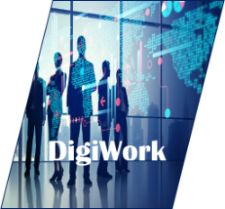Overview
Digital technology brings people, time and space together in new ways. It affects how we structure society, how we shape our ethical and political values, and how we work and interact. DigiWork captures a variety of interdisciplinary aspects and approaches on digitalisation and consequences of digitalisation in working life, work organisations and society as well as includes researchers from health and medical science, computing, social sciences and humanities. DigiWork is also interested in how new technologies bring about both challenges and opportunities at the individual, organisational and societal levels.
- At the individual level- research on the adoption of digital technology explores how the platform economy contributes to changes in the labour market towards more people being self-employed or working as freelancers. Platforms make it possible for employers to offer jobs and self-employed people to take on those jobs.
- At the group and organisational level- processes of digitalisation are explored, for instance how simple and complex information, communication systems, the use of Big Data and algorithmic decision-making may strengthen the rational mode of decision-making. Systems for decision-making can democratise these processes. This means the decisions are no longer made by designated professionals in an hierarchical structure, but rather are decentralised so that more employees, who work with the analytical tools, are empowered to participate in the process.
- At the societal level- the societal preconditions for the digitalisation of working life, including labour market changes, new industries, and the availability of jobs in the private, public and voluntary sectors are explored.
DigiWork studies the interplay between digital technologies and society emphasising research on:
- Challenges of digitalization for ethical, human and social relations.
- Implications for the labor market, working conditions and content, competence requirements and salaries.
- Significance for industrial relations, companies and organizations.
- Impact on policy-making, regulation and the welfare state.
- Influence on cultural and social development, including class, gender, ethnic and ethnical dimensions of digitalization.
DigiWork is interdisciplinary and uses mixed research methods. It explores interactions, processes and outcomes in working life in digital transformation, and understanding these across fields and sectors. How new technologies bring about challenges, but also opportunities at an individual, organisational and societal levels, are common interests. These three levels are incorporated into the research projects all of DigiWork’s research groups.
Research Groups and Projects
Learn more about The Digital Society's research groups and projects
Below are some of DigiWork's research groups and their corresponding research projects:
Complex Connections: People Places and Organisations(CC:PPO)
Projects under the research group: Complex Connections: People, Places and Organisations (CC:PPO)
Digital Decision Support Systems (DDSS)
Projects under the research group: Digital Decision Support Systems (DDSS)
- Data science professionals – organisational affiliation, work and cooperation in public organisations
- The impact of digitalisation on municipalities and professionals
- Digitalisation in the child welfare services: how professionals and service users experience the use of digital and social media
- The Pandemic as Changemaker? The County Governors Digital Communication during the Pandemic- (The project has been completed and the researchers are in the process of writing a manuscript for publication.)
- The Competence Bridge Østfold – a Digital Arena for Collaborative-driven Innovation
Technological Change, Sustainability and Society(TCSS)
Read more about the research group: Technological Change, Sustainability and Society (TCSS)
The research group TCSS is newly established and projects are being planned.
About our Researchers
DigiWork is interdisciplinary and currently consists of professors from the Department of Welfare, Management and Organisation at Faculty of Health, Welfare and Organisation, and Department of Economics, Innovation and Society at Faculty of Computer Science, Engineering and Economics. In addition, there are several PhD students involved in DigiWork-related research projects. Both faculties are located at Camus Fredrikstad and Halden.
The Faculty of Health, Welfare and Organisation is headed by Dean Randi Magnus Sommerfelt and has about 130 employees and approximately 2000 students, distributed among two Departments:
- Department of Nursing, Health and Laboratory Science
- Department of Welfare, Management and Organisation
The Faculty of Computer Science, Engineering and Economics is headed by Dean Harald Holone and has about 100 employees and 1850 students distributed among the following three departments:
